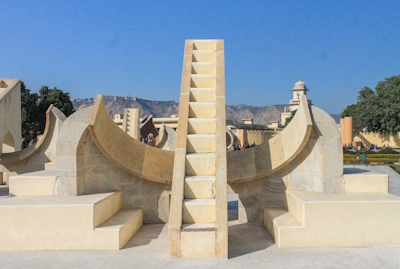Jantar Mantar

The Jantar Mantar, Jaipur is a collection of large architectural astronomical instruments.
They were built in the new state capital of Jaipur in the early 18th century on the orders of Prince Jai Singh II. He had constructed a total of five such facilities at different locations, including one in Delhi. The Jaipur observatory is the largest and best-preserved of these. It followed the tradition of Ptolemaic positional astronomy and was designed to observe the sky with the naked eye.
Community Perspective: a haven of quiet from the bustling city outside, but it is quite hard to work out how the various instruments worked except for the huge sundial. The separation of this location from the also inscribed Jaipur City seems rather artificial.

Map of Jantar Mantar
Load mapCommunity Reviews
Carlo Sarion
Philippines/New Zealand - 15-May-24 -

Jantar Mantar in Jaipur is an 18th-century observatory built to study the sky with the naked eye (yep, no telescopes). It's a small, accessible, and quite straightforward site to visit, and you get to tick both this site and Jaipur in one go. I visited Jantar Mantar twice (Dec 2013 and Dec 2023) and spent no more than an hour on both visits.
1. A UNESCO site within a UNESCO site
I used to share the opinion that Jantar Mantar as a separate site from Jaipur seemed confusing. I mean, it is well within Jaipur City’s core zone and is an integral part of the city palace’s compound. However, Jantar Mantar as a separate site has its own merits, and as I see it, India intended it that way. Its OUV rests on being an excellent example of an 18th-century architectural ensemble of scientific and technical instruments. It is also a testament to the monarch's (Jai Singh II) patronage of astronomy and cosmology, and sort of a reflection of the rich artistic and scientific culture at the time. It also fills the gap in heritage sites that are devoted to astronomy (see ICOMOS Thematic Study on Astronomical Heritage in 2010). Jaipur City’s focus is obviously way different. I reckon its separation from Jaipur City does not make Jaipur’s OUV anything less, and vice versa, and that they can stand on their own.
2. Highlights
Jantar Mantar has some 20 instruments crafted with seemingly geometric precision.I took some time to take a good look at these instruments on my second visit, as I only zoomed through this site back in Dec 2013. I have noted the instruments' purpose without really understanding (or wanting to understand) how they work. These instruments stood out to me:
- Samrat Yantra - this is the tall triangular structure that dominates the observatory. There is a cute cupola or chhatri at the very top of the structure. It is basically a giant sundial capable of accurately measuring time.
- Rama Yantra - a couple of cylindrical structures that are used to measure the position of a celestial object (e.g., the altitude of a star). Check out the scales on the walls of the structure--you can see the precision required in constructing these structures.
- Jai Prakash - it is a hemispherical, bowl-shaped instrument in the ground of an elevated platform. Notice the lines and markings on the instrument that correspond to the altitude and azimuth of the horizontal coordinate system. This instrument is quite popular.
- Nadivalaya Yantra - this is also a sundial (see photo).
- Rasivalaya Yantra - these are 12 of these miniature versions of the Samrat Yantra, each corresponding to a zodiac constellation. Notice the drawings that represent each of the zodiacs.
3. On other observatories named Jantar Mantar
Jai Singh II also commissioned the construction of observatories named Jantar Mantar in other cities: Delhi, Ujjain, Mathura, and Varanasi. Unfortunately, I haven't visited any of these other observatories, though I did check them out on Google Maps. Not visiting the one in Delhi was a real disappointment since it is situated between the sites we visited there. The observatories in these cities have fewer instruments and are smaller in scale compared to the Jantar Mantar in Jaipur. It's quite notable to me that the instruments in Jaipur and Varanasi are painted cream-yellow, while the ones in Delhi and Ujjain are in red and white, respectively.
I believe it was a good decision to exclude these observatories from the nomination, as the Jantar Mantar in Jaipur sufficiently represents what it claims as OUV. The state of conservation of the other observatories might have also been a factor at the time of the nomination. For example, the Jantar Mantar in Varanasi currently appears unkempt and littered with rubbish when viewed on Google Maps, and I wouldn't be surprised if it was in a similar condition back in 2010. Also, the Jantar Mantar in Mathura was demolished back in the mid-19th century.
Alikander99

I agree with the general sentiment that jantar Mantar is a confusing nomination.
Foremost, it's Right in the middle of jaipur old city. So it's hardly justifiable to make it a whs on its own. This is a clear case of duplication, something I've found India is particularly adept at.
Furthermore, the site is quite hard to interpret at the moment, with very simple and lackluster explanations.
The there's the OUV. The instruments though certainly monumental, weren't that advanced for the time, and in fact their size is somewhat unjustified. The astronomers in charge of the project weren't adept at architecture and the soil has given up under the heavy weight of their sun dials making the instruments unprecise. all in all I would say jantar Mantar is more of a unique expression of the science of astronomy in India. In that sense it is truly remarkable and unique (though a few more jantar Mantar exist in other Indian cities, like Delhi) and I'm happy it's part of the list.
The visit is short and pretty ordinary. Though the giant sun dial makes for great photos.
Nan

Jantar Mantar, what a weird name? When I traveled to Jaipur, I didn't really know what to expect. The name sounds more like a joke than something real.
What I found is one of those niche jewels of the world heritage list: an Indian observatory based on architectural astronomical instruments. The architectural part is key here as there were little mechanics or optics involved. Instead, you have the world's largest sundial being able to measure time by 2s due to its size. In comparison the Royal Observatory in Greenwich is tiny.
Interestingly, the site is limited to the observatory. India has in the meantime submitted Jaipur (T) itself as a separate site. The community feedback is rather positive, but to me combining Jaipur and the Jantar Mantar would yield a truly great site and the separation seems rather artificial.
Getting There
I flew in from Bangalore in the morning. I left the next morning on the train to Agra.
A popular tourist option is to do the golden triangle (Delhi, Agra, Jaipur) from Delhi with a driver. You will find plenty of offers for this online.
While You Are There
As mentioned, Jaipur City is a tentative site itself and nominated for 2019. Not to be missed Amer Fort is part of the Hill Forts of Rajasthan world heritage site.
Manisha joshi
Truly miraculous janta mantar in jaipur I visited in November 2014. It still shows the correct time the sun dial and yes my little knowledge of astrology also helped me to understand the planetary positions depicted in jantar mantar.
Clyde

I visited this WHS in January 2012. This astronomical observation site in Jaipur includes several astronomical instruments of the Mughal period. Quite interesting to visit in the middle of the Pink City.
Solivagant

My last visit to the Jantar Mantar at Jaipur was as long ago as 1992 so the accompanying photo has had to be scanned in from a 35mm slide!! But I remember the visit, and indeed the entire stay in Jaipur with pleasure. This is a worthy addition to the list and a visit to Jaipur will bring in many other fine sights too!
India’s Tentative list entry for this site originally listed the existing 4 Jantar Mantars for potential inscription (Jaipur, Delhi, Varanasi and Ujjain – a fifth at Mathura no longer exists) but must have concluded that it was better to concentrate on that at Jaipur. They were all built by Jai Singh, “a regional king under the Mogul Empire”, between 1724-7. Jaipur’s is the largest and, as I remember the one in Delhi many years ago, the better preserved/restored – though the small one in Varanasi situated atop a building is also rather fine and I have never been to Ujjain. They all provide a haven of quiet from the bustling city outside within a walled “park” containing a series (Jaipur has 14) of large (the biggest at Jaipur is 27m tall) and complicated-looking astronomic instruments, known as “Yantras” , each designed to measure some aspect of the passage of heavenly bodies – determining time, predicting eclipses, placing planets etc. My photo is of the “Jai Prakash” – a hemispherical sundial said to be Jai Singh’s “most elaborate and complex instrument”. I would not claim, either at the time of the visit or now, to understand how the various instruments worked - if you want a run down have a look at http://www.jantarmantar.org/Architecture_Science_web.pdf . We didn’t take guide in those “far off” days but I could imagine that doing so or having a good written description of how each instrument worked could add to the visit experience.
Community Rating
- : Craig Harder Travelure Yamen Amitlchoudhuryjbp Lembu Jonoprout
- : Juropa RahulSharma Aspasia
- : Wojciech Fedoruk Randi Thomsen Ge zhang Svein Elias Nan Joyce van Soest MoPython Akacesfan Fede1203 Martina Rúčková Bernard Joseph Esposo Guerrero
- : Philipp Peterer Ralf Regele Gordon Mitchell Adiaro18 Monica Tasciotti David Marton Tevity GerhardM Afshin Iranpour Daniel Gabi Priyaranjan Mohapatra Tony0001 Ivan Rucek J_neveryes
- : Els Slots Solivagant Stanislaw Warwas Alexander Parsons Lichia Frederik Dawson Tarquinio_Superbo Jean Lecaillon Tony H. Thomas Kunz Zoë Sheng Philipp Leu YAO WEI Alex Marcean Sachin Luke LOU Kevin McFarland Mikko Chalamphol Therakul Laurine Jon Opol BMuramatsu
- : Clyde Travtasy Lucio Gorla HaraldOest Carlo Sarion Alikander99 Javier
- : Vernon Prieto Alexander Lehmann Riccardo Quaranta Shandos Cleaver Akhilpreeti Adrian Turtschi Lukasz Palczewski
Site Info
Site History
2010 Advisory Body overruled
ICOMOS advised Referral (Management Plan issues)
2010 Inscribed
Site Links
Unesco Website
Related
In the News
Connections
The site has 9 connections
Constructions
History
Science and Technology
Timeline
Trivia
Visiting conditions
WHS on Other Lists
World Heritage Process
Visitors
317 Community Members have visited.
The Plaque
 (external source)
(external source)